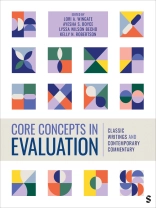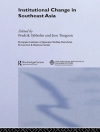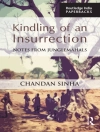This unique book features original writings from evaluation′s foundational thinkers, together with new commentaries from contemporary authors. Each section includes an introduction to a core evaluation concept by the editors, a classic reading, two commentaries on that topic by contemporary authors, and a reflection guide written by the editors.
Daftar Isi
Introduction – Lori A. Wingate, Ayesha S. Boyce, Lyssa Wilson Becho, and Kelly N. Robertson
Introduction Classic Piece: Let’s Eliminate the Confusion: What is Evaluation? – Leander L. Boykin
Part I. Evaluation is a distinct form of inquiry that is oriented to reaching judgments of merit, worth, or significance.
Part I Introduction – Lyssa Wilson Becho
Part I Classic Piece: The Nature of Evaluation – Michael Scriven
Chapter 1: Amending the Architectural Blueprints for Evaluation – Bianca Montrosse-Moorhead and Khalil Bitar
Chapter 2: Lack of Discipline: Answering Scriven’s Call for Value in (Program) Evaluation – Ghislain Arbour
Part I Reflection Guide – Lyssa Wilson Becho
Part II. Engagement enhances the usefulness and relevance of evaluation.
Part II Introduction – Kelly N. Robertson
Part II Classic Piece: The Stakeholder Approach to Evaluation: Origins and Promise – Carol Weiss
Chapter 3: Evaluation Engagement: Historical Perspectives and New Directions With Community-Based Participatory Research (CBPR) Principles – Tatiana E. Bustos, Oyesola Oluwafunmilayo Ayeni, and Jessica S. Saucedo
Chapter 4: I.M.P.A.C.T.: A Manumission Mindset and Other Engagement Approaches for Evaluation – Sharon Attipoe-Dorcoo and Norma Martínez-Rubin
Part II Reflection Guide – Kelly N. Robertson
Part III. Evaluation is inherently political.
Part III Introduction – Lori A. Wingate
Part III Classic Piece: What Have We Learned About the Politics of Program Evaluation? – Eleanor Chelimsky
Chapter 5: The Power and Politics of Knowledge Production in Program Evaluation: Funder, Methodological, and Pedagogical Colonialism – Jennifer Billman and Bagele Chilisia
Chapter 6: Walking the Tightrope Between Independence and Responsiveness: Falling Off Is Not an Option – Rakesh Mohan
Part III Reflection Guide – Lori A. Wingate
Part IV. Culturally responsive evaluation practice can lead to a more just society.
Part IV Introduction – Ayesha S. Boyce
Part IV Classic Piece: Responsive Evaluation Amistad Style: Perspectives of One African American Evaluator – Stafford Hood
Chapter 7: En Busca de las Voces Latinas in CRE: Reflections From a Program Evaluation Latina – Grettel Arias Orozco
Chapter 8: Black Methodologies for Black Evaluators – Deja Taylor, Sojourner White, Superior Murphy, Radaya Ellis, and monique liston
Part IV Reflection Guide – Ayesha S. Boyce
Part V. Evaluation’s value is realized through its use and influence.
Part V Introduction – Ayesha S. Boyce
Part V Classic Piece: Utilization-Focused Evaluation – Michael Quinn Patton
Chapter 9: Aims, Aspirations, and Consequences: Problematization at the Intersection of Culture and Evaluation Use – Jeremy Acree and Jill Chouinard
Chapter 10: Beyond the Project: Using Evaluation to Reimagine the Future in Africa – Caitlin A. Blaser Mapitsa and Mine Pabari
Part V Reflection Guide – Ayesha S. Boyce
Part VI. Evaluation is a reflexive practice: Evaluation can and should be evaluated.
Part VI Introduction – Lori A. Wingate
Part VI Classic Piece: Metaevaluation – Daniel L. Stufflebeam
Chapter 11: Revisiting Metaevaluation Through the Perspectives of the Global South – Paidamoyo Chikate, Satlaj Dighe, Padma Kannan, and John M. La Velle
Chapter 12: A New Story for Metaevaluation – Tiffany Tovey and Libby Smith
Part VI Reflection Guide – Lori A. Wingate
References
Author Index
Subject Index
Tentang Penulis
Kelly N. Robertson works as a principal research associate at The Evaluation Center at Western Michigan University. She has extensive experience conducting social justice-focused evaluations, publishing scholarly articles, and creating evaluation capacity-strengthening resources (e.g., webinars, guides, checklists). Dr. Robertson co-led the creation of The Evaluation Center’s online training program, Valeo. She has a Ph.D. in interdisciplinary evaluation and over 15 years of experience in the field of program evaluation. She also has a master’s degree in international development and a certificate in nonprofit leadership.












